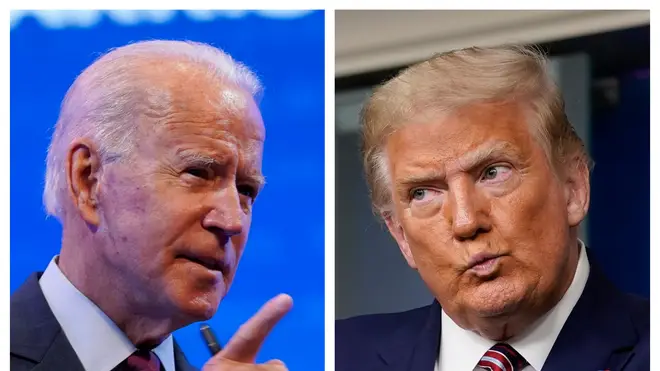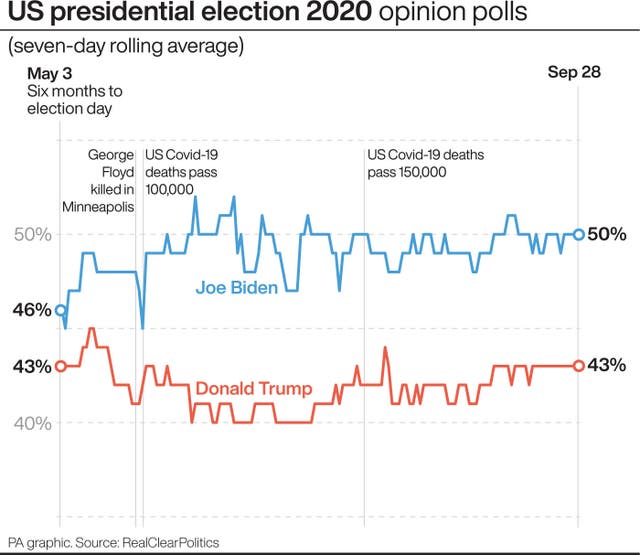
Tom Swarbrick 4pm - 6pm
28 September 2020, 18:34

Donald Trump and Joe Biden are scheduled to meet on the debate stage for the first time on Tuesday in Ohio.
Ahead of the first debate between US President Donald Trump and his Democratic challenger Joe Biden, each campaign is promising a stark contrast in policy, personality and preparation.
Mr Trump has decided to skip formal preparation, though he said that former New York mayor Rudy Giuliani and his former 2016 primary rival, Chris Christie, are helping him.
“We had a little debate prep before we came here,” Mr Trump told reporters as Mr Giuliani and Mr Christie looked on in the press briefing room at the White House on Sunday.
And while Mr Biden’s team believes the significance of the debate may be exaggerated, the Democratic nominee has been aggressively preparing to take on the president.
Mr Biden’s campaign has been holding mock debate sessions featuring Bob Bauer, a senior adviser to Mr Biden and former White House general counsel, playing the role of Mr Trump.
Mr Trump and Mr Biden are scheduled to meet on the debate stage for the first time on Tuesday at Case Western Reserve University and the Cleveland Clinic in Ohio. The 90-minute event, moderated by Fox News host Chris Wallace, is the first of three scheduled presidential debates. Vice president Mike Pence and California senator Kamala Harris, Mr Biden’s running mate, will debate in October.
For some, the debates represent the most important moments in the 2020 campaign’s closing days, a rare opportunity for millions of voters to compare the candidates’ policies and personalities side-by-side on prime-time television.
Mr Trump has been trailing Mr Biden in the polls for the entire year, a reality that gives the president an urgent incentive to change the direction of the contest on national television if he can.

Others, including those close to Mr Biden’s campaign, do not expect the debates to fundamentally change the race no matter what happens, given the pandemic and the economy. They also point to high-profile debates in past elections that were thought to be game-changing moments at the time but that ultimately had little lasting effect.
Those with knowledge of Mr Biden’s preparations suggest he will not take the fight to Mr Trump if he can avoid it. But on Saturday, at least, he was on the attack when he discussed his strategy on TV network MSNBC.
“I’m prepared to go out and make my case as to why I think he’s failed and why I think the answers I have to proceed will help the American people, the American economy and make us safer internationally,” Mr Biden said, arguing that Mr Trump will not convince voters with broadsides because “the people know the president is a liar”.
He also compared Mr Trump to Adolf Hitler’s propaganda minister, Joseph Goebbels, saying: “He’s sort of like Goebbels. You say the lie long enough, keep repeating, repeating, repeating, it becomes common knowledge.”
While Mr Biden has said he will try to be a fact checker of sorts on stage, the Democrat is being advised to avoid direct confrontations and instead redirect the conversation to more familiar campaign themes of unity and issues that matter most to voters: the economy, healthcare and the pandemic.
Mr Trump’s aides and allies said heading into the weekend that he had not been in formal preparations. The president offered mixed messages on Sunday with his confirmation that Mr Giuliani and Mr Christie were helping him, essentially combining to play the role of Mr Biden. Yet Mr Trump downplayed the sessions.
“Sometimes you can go too much in that stuff,” Mr Trump said, noting that he defeated Hillary Clinton four years ago despite her extensive debate preparation.
The president added that he takes far more questions from the White House press corps than Mr Biden takes from the reporters covering his campaign, arguing those sessions with reporters are a form of debate preparation.